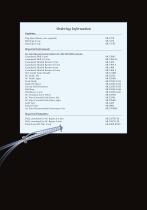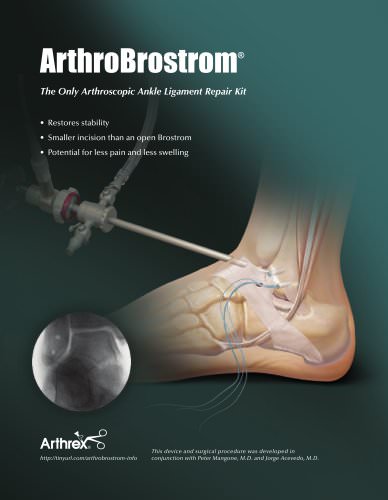 Website:
Arthrex
Website:
Arthrex
Stabilization of Acute Acromioclavicular Joint Dislocations using Dog Bone Button Technology
1 /
6Pages
Catalog excerpts

Surgical Technique AC Repair - Dog Bone Button Stabilization of Acute Acromioclavicular Joint Dislocations using Dog Bone Button Technology
Open the catalog to page 1
Stabilization of Acute Acromioclavicular Joint Dislocations using Dog Bone Button Technology The Dog Bone Button is a precontoured, titanium button that allows the use of multiple FiberTapes® for AC joint reduction, providing a construct that is twice as strong as existing AC joint repair devices. Since the buttons are attached to the FiberTapes independently, only suture material is passed through the clavicle and coracoid tunnels, allowing the repair to be completed through smaller tunnels. Tunnel drilling is made easier with new AC Guide arms and a new 2.4 or 3 mm cannulated Drill. The...
Open the catalog to page 2
1 Through the low anterior portal, place the appropriate AC Guide* under the coracoid base and drill the clavicle and coracoid tunnels using the 2.4 or 3 mm cannulated Drill. *Use the left guide (AR-2254L) for a left shoulder and use the right guide (AR-2254R) for a right shoulder. 3 Clip the limbs of a FiberTape Loop and a TigerTape® Loop into the slots of a Dog Bone Button so that the tapes form a U-shape. Slide the button to the base of the tapes. The tapes should wrap around the laser line, ensuring that the concavity of the button will sit against the base of the coracoid. 2 Remove the...
Open the catalog to page 3
Surgical Technique 5 Seat the Dog Bone Button at the base of the coracoid. The concavity should seat against the coracoid and the orientation line should be in line with the arch of the coracoid. 6 Cut the splice from each loop and clip a second Dog Bone Button onto the suture limbs exiting the clavicle. The concavity should face the clavicle and the orientation line should be in line with the axis of the clavicle. Post-op Protocol Place the patient in a sling for six weeks, allowing elbow motion and gentle passive external rotation with the elbow by the side. At six weeks, discontinue...
Open the catalog to page 4
Ordering Information Implants: Dog Bone Button (two required) FiberTape Loop TigerTape Loop Required Instruments: AC Joint Reconstruction Master Set (AR-2255MS) includes: Cannulated Drill, 4 mm Cannulated Drill, 4.5 mm Cannulated Headed Reamer 5 mm Cannulated Headed Reamer 5.5 mm Cannulated Headed Reamer 6 mm Cannulated Headed Reamer 6.5 mm ACL Guide Frame Handle AC Guide, left AC Guide, right Fixed Guide Guide Pin Sleeve Clavicle Drill Positioner Drill Stop Drill Sleeve, 3 mm AC Tenodesis Screw Driver AC Joint Coracoid Graft Passer, left AC Joint Coracoid Graft Passer, right Graft Sizer...
Open the catalog to page 5
This surgical technique has been developed in cooperation with Paul Brady, M.D., Knoxville, TN. www.arthrex.com ...up-to-date technology just a click away This description of technique is provided as an educational tool and clinical aid to assist properly licensed medical professionals in the usage of specific Arthrex products. As part of this professional usage, the medical professional must use their professional judgment in making any final determinations in product usage and technique. In doing so, the medical professional should rely on their own training and experience and should...
Open the catalog to page 6All Arthrex catalogs and technical brochures
-
Imaging and Resection Catalog
108 Pages
Archived catalogs
-
Arthroscopic Hand Instruments
28 Pages
-
Foot & Ankle
138 Pages
-
Ankle Arthroscopy
11 Pages
-
Shoulder Repair Technology
114 Pages
-
Foot and Ankle
12 Pages
-
Hand & Wrist
64 Pages
-
Imaging & Resection
80 Pages
-
Hip Labral Scorpion
1 Pages
-
For Fracture Treatmen
8 Pages
-
Clavicle Plate and Screw System
12 Pages
-
A rthrex Graft Tubes
4 Pages
-
HTO Medial PEEK Implant
6 Pages
-
ACL TightRope® RT - LS0178
2 Pages







































